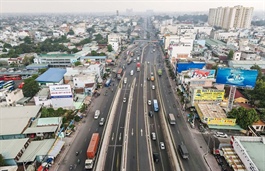Homestay businesses struggle during pandemic
Homestay businesses struggle during pandemic
The homestay service in the northern province of Quang Ninh has dynamic growth since 2018, showing off the popular trend of short-term accommodation in the province.

However, with increased travel and visa restrictions slashing bookings, in the last two years, the COVID-19 pandemic has hurt the service all over the country. Homestay operators in the northeastern province of Quang Ninh are no exception.
But they are now preparing for tourists coming back.
Nguyen Thi Loan, a homestay owner in Bai Chay ward of Quang Ninh Province, said that her revenue had fallen 90 per cent from July last year.
Despite this, she has offered significant discounts, but received no guests.
“Many guests have cancelled all their bookings due to pandemic fears and troubles acquiring visas. I have shifted to rent the apartments long-term to get through the pandemic crisis and maintain the revenue for my business,” she said.
Loan said she started the homestay business in 2018 and her business revenue was stable until the end of 2019. In addition, she also decided to borrow from banks to buy vessels to make sightseeing tours around renowned Ha Long Bay, a UNESCO World Heritage Site.
One vessel costs about VND7 billion (US$305,000). However, she has had to anchor all her vessels in Ha Long harbour because there have been no guests in the last two years.
Loan said that since July 2020, accommodation services really went down due to the downturn in the tourism industry amid COVID-19. Fortunately for Loan, her long-term apartment available for rent helped save her from plummeting revenues.
Loan revealed that before the pandemic, every month her homestay of 10 flats received so many requests from tourists to stay that she often had to refuse.
The rent for a flat at her homestay ranged between VND1.3-VND2 million per day previously, she said. But now the price was between VND400,000-500,000 per day with a maximum capacity for 4-5 people.
Now many young people offer homestay services by taking advantage of unused rooms in their houses or renting from other house owners and renovating into homestay.
They are then offered to tourists who want to stay with locals when travelling. Some others even rent apartments and houses to tourists, according to Loan.
Le The Viet, a homestay operator in Bai Chay ward has also faced the same problem. Viet said: “If the pandemic is not contained, many people like me will lose all our money while many local people will have no jobs.”
Viet said: “ I began running this kind of business from January 2019. My business ran smoothly for nearly one year. It then face a hard time as COVID-19 pandemic broke out in early 2020.”
Since then, many homestays in the province have had to change their business model to long-term rent at a very low-rental price but still has no guests.
Viet lamented that 99 per cent of accommodation services in Quang Ninh Province had to close because of the prolonged pandemic.
Vaccinations to reinvigorate homestays
Quang Ninh authorities hope for a return to normality through vaccination against COVID-19, as the country has launched its vaccination campaign since March 2021.
The World heritage site - Ha Long Bay has long been a good choice for millions of tourists. It will continue to be a famous destination when Viet Nam reopens tourism.
Real estate investors are upbeat about Viet Nam’s post-pandemic economy, urging each other to grasp the opportunities arising from new trends to seek potentially profitable projects.
Phan Mai, an owner of the Airbnb vacation rentals in Ha Long, said Airbnb's share price had doubled at its initial public offering (IPO) at the end of 2020.
The COVID-19 pandemic has forced tourists to rent private accommodation instead of hotels to minimise human-to-human contact. Mai said that apart from her three homestays run by her, she planned to invest in two more apartments of the luxury Sun Marina Town project in downtown Bai Chay.
She said that in Ha Long City, Airbnb vacation rentals had gradually become more popular, but not many could compare with luxury hotel rooms.
As of 2019, Ha Long had approximately 18,000 rooms. On average, Ha Long City welcomes more than 4 million visitors annually. The average length of stays for visitors is about 2.7 days.
Ha Long City needs to prepare more than 10 million nights per year, equivalent to nearly 15,000 rooms per day. During peak season, the number of visitors will be doubled or tripled at the weekend. The city will need at least 30,000 rooms available to meet the demand.
Ha Long is always determined to be one of the leading cities in tourism by offering good policies to lure powerful investors. Following the trend of developing green and smart cities and urban areas, many large corporations such as Sun Group, Vingroup, BIM, and FLC have invested in big projects and high-class entertainment and resort complexes in the region. This is why homestays and apartment businesses will become more attractive to investors.
Quang Ninh recently decided to offer a 50 per cent discount on entry fees to selected tourists sites. This is part of the province’s latest policy to stimulate tourism.
Given the current situation, the province expects that in the first half of next year, Ha Long Bay will welcome 1.2 million-1.5 million visitors. The number of tourists to the province last year reached 4 million, and the province’s tourism revenue was recorded at VND7 trillion.






















